Choosing the perfect battery for your Toyota 4Runner can feel like deciding the fate of the universe. You need a reliable option that won't leave you stranded during your next adventure. While many batteries promise performance, not all deliver on that promise. Whether you're tackling off-road trails or steering through city streets, the right battery can make all the difference. So, which top contenders should you consider to guarantee your 4Runner runs smoothly and efficiently? Let's explore the best options available to you.
Need tools for your project? Toolbox, a tool rental marketplace, might be worth a look.
Quick Takeaways
- Optima Batteries 8020-164 35 RedTop offers exceptional cranking power and durability, ideal for reliable starts in any condition.
- Weize Platinum AGM provides 680 CCA and a 100-minute reserve capacity, ensuring dependable performance in extreme temperatures.
- ACDelco Gold 48AGM is known for its long lifespan and robust design, performing well in harsh weather with a 36-month warranty.
- UPLUS BCI Group 140R is designed for start-stop technology, featuring 570 CCA and 120 minutes of reserve capacity for added reliability.
- OPTIMA High Performance RedTop boasts fast charging capabilities and 720 CCA, making it a strong contender for performance in the 4Runner.
Optima Batteries 8020-164 35 RedTop Starting Battery
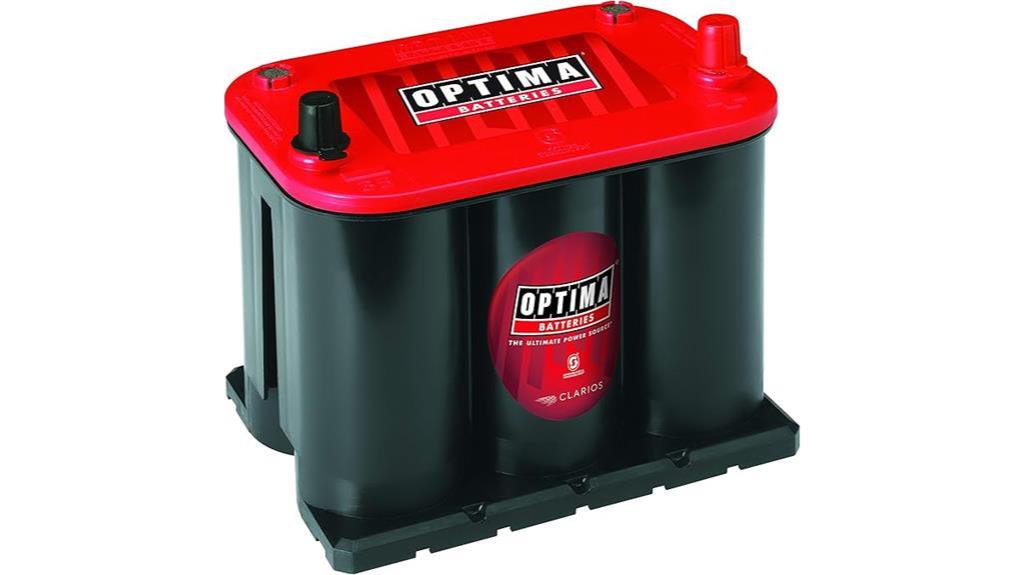
The Optima Batteries 8020-164 35 RedTop Starting Battery stands out as an excellent choice for Toyota 4Runner owners who demand reliable performance in extreme conditions. With its unique SpiralCell design, this battery delivers high power cranking, making it ideal for hot rods and off-road adventures. Its maintenance-free, non-spillable nature allows for versatile mounting, while it offers 15 times the vibration resistance compared to standard flooded batteries. Weighing 31.7 pounds and measuring 9.38 x 7.69 x 6.75 inches, it's compact yet powerful. Customers appreciate its longevity, often lasting 8-10 years, though some report challenges with warranty claims. Overall, the RedTop is praised for its quick recharge capabilities and resilience in harsh environments, solidifying its place in the 4Runner community.
Best For: The Optima Batteries 8020-164 35 RedTop Starting Battery is best for automotive enthusiasts and off-roaders seeking reliable performance in extreme conditions.
Pros:
- High power cranking capability, ideal for hot rods and off-road vehicles.
- Maintenance-free and non-spillable design allows for versatile mounting options.
- Exceptional longevity, with many users reporting 8-10 years of use.
Cons:
- Warranty claims can be challenging, with varying customer service experiences.
- Some users report receiving the battery not fully charged upon delivery.
- A few customers suggest considering alternative brands for better longevity and support.
Weize Platinum AGM Automotive Battery (BCI Group 47-12v 60ah)
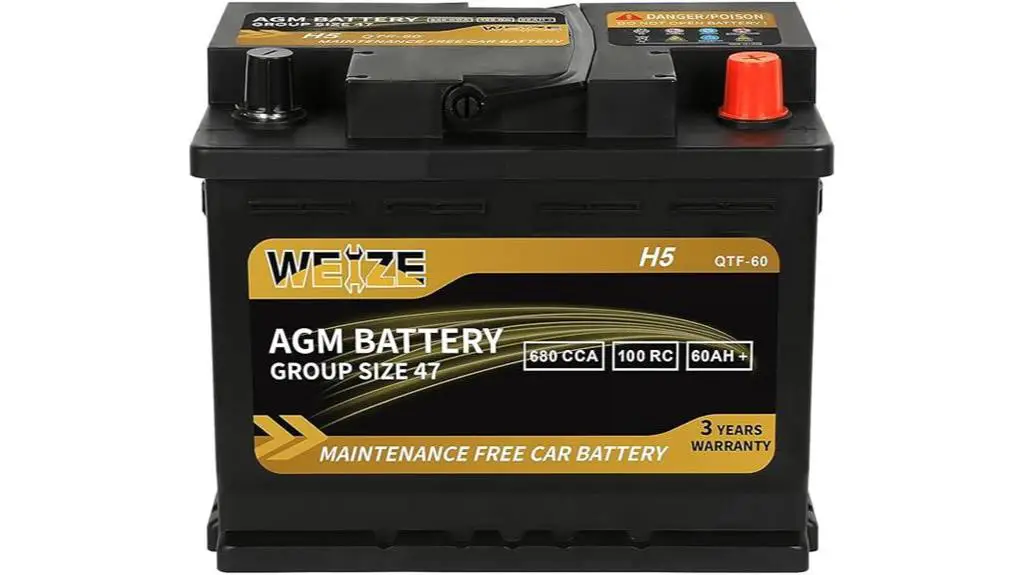
For Toyota 4Runner owners seeking a reliable and high-performance battery, the Weize Platinum AGM Automotive Battery (BCI Group 47-12v 60ah) stands out with its impressive cold cranking amps (680A) and maintenance-free design. This battery features a 100-minute reserve capacity and operates effectively in temperatures ranging from -22°F to 158°F. Weize's AGM technology guarantees superior performance, longer lifespan, and enhanced vibration resistance, making it ideal for vehicles with high-demand accessories. Weighing 41.6 pounds and compactly sized, it offers easy installation with tapered terminals. Customers rave about its instant starting power and improved lighting, resulting in a strong 4.6-star rating. With a 36-month warranty, the Weize Platinum battery delivers exceptional value and reliability for 4Runner enthusiasts.
Best For: Toyota 4Runner owners looking for a reliable, high-performance battery with superior cold weather starting capabilities.
Pros:
- Maintenance-free design allows for hassle-free use and eliminates the need for regular upkeep.
- High cold cranking amps (680A) ensure reliable starting power, even in extreme temperatures.
- Three-year warranty provides added peace of mind and demonstrates the manufacturer's confidence in the product.
Cons:
- Some minor fitting issues reported by users may require adjustments during installation.
- Weight (41.6 pounds) might be cumbersome for some users during installation or handling.
- Competitive pricing may still be higher than some traditional lead-acid batteries, potentially deterring budget-conscious buyers.
ACDelco Gold 48AGM (88864541) 36 Month Warranty AGM BCI Group 48 Battery
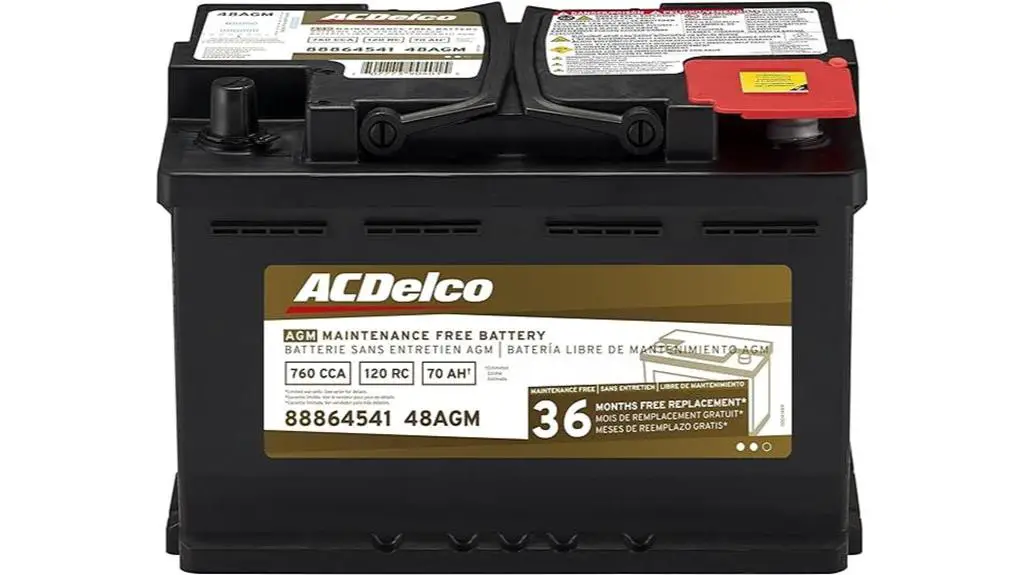
Built for performance and reliability, the ACDelco Gold 48AGM (88864541) battery stands out as an ideal choice for Toyota 4Runner owners seeking a dependable AGM battery. This BCI Group 48 battery boasts a 36-month warranty, ensuring peace of mind for users. Weighing 45.5 pounds and measuring 7.5D x 11.9W x 7.6H, it features high-density negative paste and enhanced life alloy, both designed to improve performance and lifespan. The robust envelope separator keeps acid circulation efficient while preventing shorts. Users appreciate its long life and temperature resilience, with many reporting over six years of reliable service. However, potential buyers should verify purchase sources to avoid warranty issues with unauthorized sellers.
Best For: Toyota 4Runner owners seeking a reliable and high-performance AGM battery.
Pros:
- Long lifespan with many users reporting over six years of service.
- Temperature resilience allows for reliable performance in extreme weather conditions.
- 36-month warranty provides peace of mind for users.
Cons:
- Potential warranty issues if purchased from unauthorized sellers.
- Some users report fit issues during installation.
- Weight may be a consideration for certain vehicle setups.
UPLUS BCI Group 140R Car Battery (AGM-L50-UP)
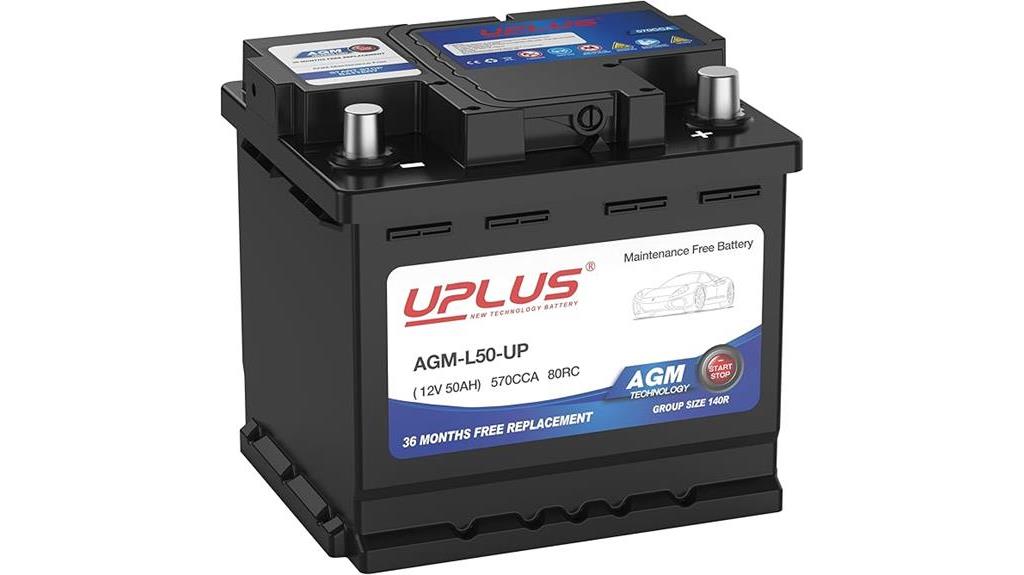
Designed for vehicles with start-stop technology, the UPLUS BCI Group 140R Car Battery (AGM-L50-UP) stands out as an ideal choice for Toyota 4Runner owners who demand reliable power for multiple electrical systems. This maintenance-free, 12V battery boasts a capacity of 50Ah and delivers a robust 570 cold cranking amps (CCA). With a reserve capacity of 120 minutes, it's perfect for powering large electrical loads, like navigation systems and DVD players. The battery features a calcium lead positive grid, ensuring low resistance and high conductivity. Its impressive 15 times vibration resistance and vent cap design enhance safety. With a 3-year warranty and local support, the UPLUS battery combines performance and reliability for an excellent driving experience.
Best For: The UPLUS BCI Group 140R Car Battery is best for Toyota 4Runner owners needing a reliable power source for multiple electrical systems, particularly in vehicles with start-stop technology.
Pros:
- Maintenance-free design eliminates the need for regular upkeep.
- High cold cranking amps (570CCA) ensure reliable starts in cold conditions.
- 15 times more vibration-resistant, enhancing durability and longevity.
Cons:
- Some users report fitment issues leading to complications during installation.
- Experiences vary, with some customers facing shipping challenges.
- Compatibility verification is crucial, as some users encountered performance issues.
OPTIMA High Performance RedTop Sealed AGM Car Battery
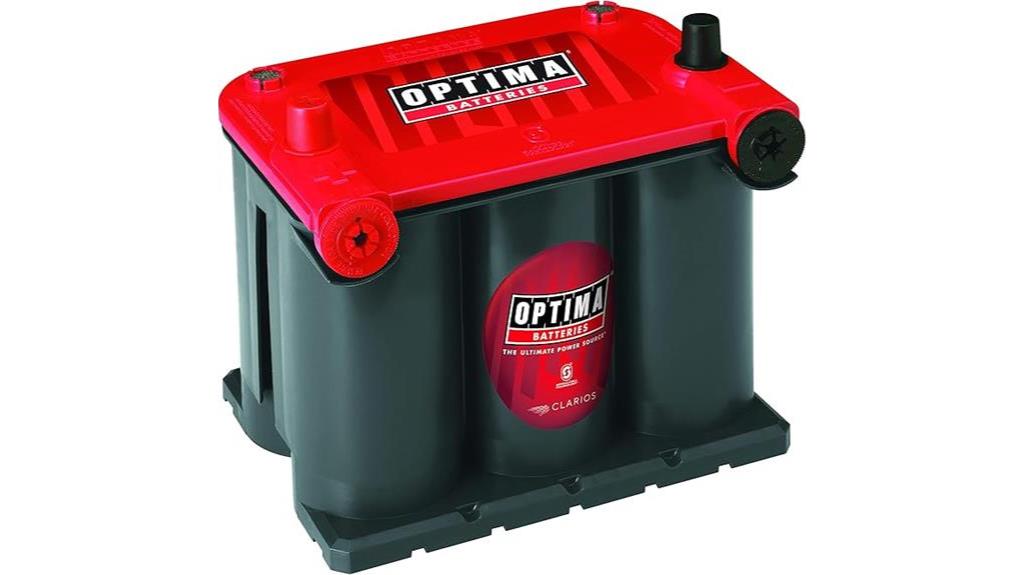
With its SpiralCell Technology, the OPTIMA High Performance RedTop Sealed AGM Car Battery delivers exceptional starting power, making it an excellent choice for Toyota 4Runner owners who frequently tackle challenging weather conditions or rough terrain. This 12-volt battery boasts 720 cold cranking amps, ensuring reliable performance even in extreme conditions. Weighing 33.1 pounds and featuring dual terminals, it's designed for versatility. Its maintenance-free, non-spillable design adds convenience, while the battery's resistance to vibration and longer lifespan makes it stand out. Users appreciate its fast charging capabilities, though some have reported mixed experiences with longevity and warranty support. Overall, the OPTIMA RedTop is a dependable option for those needing robust performance in demanding environments.
Best For: The OPTIMA High Performance RedTop Sealed AGM Car Battery is best for vehicle owners who require reliable starting power in extreme weather conditions and demanding environments.
Pros:
- Maintenance-free design for easy user convenience.
- Exceptional vibration resistance providing enhanced durability.
- Faster charging capabilities ensuring readiness when needed.
Cons:
- Mixed experiences with longevity, with some users reporting shorter lifespan.
- Challenges with warranty processes, leading to customer service frustrations.
- Varied performance based on specific usage patterns and environmental conditions.
Factors to Consider When Choosing Batteries for Toyota 4Runner
When choosing a battery for your Toyota 4Runner, you'll want to take into account several key factors. Battery type, cold cranking amps, and reserve capacity are essential for ensuring reliable performance. Additionally, don't forget about maintenance requirements and the size compatibility with your vehicle.
Battery Type Selection
Choosing the right battery for your Toyota 4Runner involves several significant factors that can greatly affect its performance and reliability. First, consider the type of battery technology. AGM (Absorbed Glass Mat) batteries offer superior performance and vibration resistance compared to traditional lead-acid batteries, making them a smart choice for off-road adventures.
Next, look at the reserve capacity (RC) rating. You'll want a battery that can handle your vehicle's demands, typically ranging from 90 to 120 minutes. This is especially important if you use electrical accessories frequently.
Also, verify the physical dimensions of the battery match your 4Runner's battery compartment specifications. A proper fit is essential for secure installation and peak performance.
Lastly, don't overlook the warranty duration. A battery with at least a 3-year warranty provides peace of mind regarding its longevity and reliability. By taking these factors into account, you can confidently select a battery that will keep your 4Runner running smoothly and efficiently.
Cold Cranking Amps
Understanding Cold Cranking Amps (CCA) is essential for ensuring your Toyota 4Runner starts reliably, especially in chilly conditions. CCA measures a battery's ability to crank an engine in cold temperatures, and higher ratings mean better starting power when the mercury drops. For your 4Runner, it's generally recommended to choose a battery with at least 600 CCA if you live in colder climates.
Different battery types have varying CCA ratings. For example, Absorbent Glass Mat (AGM) batteries often provide higher CCA compared to traditional flooded batteries. This can make a significant difference in your vehicle's performance during extreme weather.
When selecting a battery, it's important to match the CCA rating to your 4Runner's specific requirements. A battery that doesn't meet these needs may lead to starting issues and can shorten the battery's lifespan. By ensuring you have a battery with adequate CCA, you're taking the first step toward reliable performance, regardless of the season. So, before making a purchase, always check those CCA ratings to keep your 4Runner ready for any adventure, no matter the weather conditions.
Reserve Capacity Importance
While Cold Cranking Amps (CCA) are fundamental for dependable starts in chilly conditions, reserve capacity (RC) plays a significant role in your Toyota 4Runner's overall performance, especially during adventures or emergencies. RC indicates how long your battery can power essential electrical systems if the alternator fails. A battery with a reserve capacity of 100 minutes can keep your vehicle's electrical systems operational, which is essential when you're off the beaten path or facing unexpected situations.
When choosing a battery for your 4Runner, it's crucial to take into account the RC rating to guarantee it meets the demands of your accessories and features, particularly during extended outdoor activities. AGM batteries typically outperform traditional flooded batteries, offering better performance and longer RC ratings. This can be a game-changer when it comes to reliability, especially in cold weather starts or when using high-demand electrical accessories.
In short, a higher reserve capacity enhances your vehicle's overall performance, making sure you're never left in the dark—literally or figuratively—when you need your 4Runner the most. Prioritizing RC will keep your adventures running smoothly, no matter where the road takes you.
Maintenance Requirements
Maintaining your Toyota 4Runner's battery is important for guaranteeing reliable performance, especially during outdoor adventures. Most modern automotive batteries, including AGM types, are designed to be maintenance-free, which means you won't need to check fluid levels regularly. However, it's still essential to inspect your battery terminals periodically. Look for any signs of corrosion and verify they're clean and tightly connected, as this helps maintain peak performance.
Another key factor is monitoring your vehicle's alternator functionality. Inadequate charging can greatly shorten your battery's life, so make sure everything's working correctly. Additionally, be mindful of extreme temperatures; excessive heat can harm battery health. Choosing a battery that's suitable for your local climate is critical.
To catch any potential issues early, regularly test your battery's voltage and cold cranking amps (CCA). Doing this can help identify problems before they lead to starting failures, guaranteeing you're always ready for your next adventure. By following these maintenance requirements, you'll maximize your battery's lifespan and performance, allowing you to enjoy your Toyota 4Runner to the fullest.
Size and Compatibility
When picking a battery for your Toyota 4Runner, you need to take size and compatibility into account to guarantee a smooth fit and dependable performance. Start by checking the manufacturer's specifications, which typically call for a Group 24F or Group 27 battery size. It's essential that the dimensions match your 4Runner's battery compartment, generally around 9.5 inches in length, 6.9 inches in width, and 7.5 inches in height.
Next, pay attention to the terminal layout. The terminals must align with your vehicle's existing setup; incorrect positioning can cause installation headaches and potential damage. Cold Cranking Amps (CCA) also play a significant role, especially if you live in colder climates. Aim for a battery with at least 600 CCA for reliable starting in cold weather.
Lastly, consider the Reserve Capacity (RC). Opt for a battery that offers a minimum of 90 minutes of RC, particularly if your vehicle has high electrical demands. By taking these factors into account, you'll make sure that your new battery fits properly and performs at its best.
Warranty Considerations
Warranty considerations can make or break your battery selection for a Toyota 4Runner. When choosing a battery, pay close attention to the warranty duration. Many options offer warranties ranging from 3 to 36 months, which can give you insight into the product's reliability and the manufacturer's confidence in their product.
Next, review the warranty terms carefully. Some batteries may have limitations on coverage, especially for damage caused by improper installation or misuse. This can affect your ability to make claims if issues arise. Also, check if the warranty includes free replacement options, as this can provide extra peace of mind in case your battery fails prematurely.
Understanding the warranty claim process is essential, too. Experiences can vary widely; some manufacturers offer streamlined and supportive customer service, while others may not. Finally, always purchase from authorized retailers to guarantee your warranty claims are honored. Batteries bought from unauthorized sellers might not be recognized by the manufacturer, leaving you without coverage when you need it most. By considering these warranty factors, you can make a more informed decision for your Toyota 4Runner.
Price Vs. Performance
Choosing the right battery for your Toyota 4Runner involves weighing both price and performance. Higher-priced batteries often feature advanced technologies like AGM or SpiralCell designs, which can greatly enhance their performance and lifespan compared to standard flooded batteries. It's crucial to prioritize performance metrics such as Cold Cranking Amps (CCA) and Reserve Capacity (RC), as these directly influence your vehicle's ability to start in various weather conditions and power its electrical accessories.
While lower-priced options may seem appealing initially, they often come with shorter lifespans, leading to more frequent replacements and higher long-term costs. Batteries that offer longer warranties typically indicate greater manufacturer confidence in their longevity, a key aspect in evaluating the price-to-performance ratio.
Don't forget to check customer feedback regarding performance and reliability. Real-world experiences can provide valuable insights into whether a higher price truly correlates with better performance. Ultimately, balancing your budget with the right performance metrics will guarantee you make a wise investment that keeps your 4Runner running smoothly for years to come.
Common Questions
What Is the Average Lifespan of a Toyota 4runner Battery?
The average lifespan of a Toyota 4Runner battery typically ranges from three to five years, depending on factors like climate, driving habits, and maintenance. If you're frequently short-tripping or exposing the battery to extreme temperatures, it might wear out faster. Regularly checking the battery's condition and keeping the terminals clean can help extend its life. When it starts showing signs of weakness, like slow starts, it's time to contemplate a replacement.
Can I Use a Different Battery Size in My 4runner?
Swapping sizes may seem simple, but it's essential to take into account compatibility! You can technically use a different battery size in your 4Runner, but it might not fit properly or provide the power you need. Mismatched sizes can lead to poor performance or even damage. Always check your owner's manual for the recommended size and specifications. Sticking to the right battery guarantees your vehicle runs reliably and efficiently. Keep your 4Runner happy!
How Do I Properly Dispose of an Old Car Battery?
To properly dispose of an old car battery, you'll want to take it to a recycling center or an auto parts store that accepts batteries. Many places offer incentives for returning batteries, so it's worth checking. Never throw it in the trash, as it contains harmful substances. If you're unsure, contact your local waste management facility for guidance on safe disposal options in your area. It's important to handle it responsibly!
What Are Signs of a Failing Battery in a Toyota 4runner?
They say, "A stitch in time saves nine," and that's true for your battery too. If you notice your Toyota 4Runner struggling to start, dimming headlights, or electrical issues, it's time to pay attention. You might also see a swollen battery case or leaking fluid. Don't ignore these signs; they indicate your battery's on its last legs. Catching problems early can save you from being stranded unexpectedly.
Are There Any Specific Maintenance Tips for 4runner Batteries?
To keep your 4Runner's battery in top shape, regularly check the terminals for corrosion and clean them when needed. Make certain the battery's securely mounted to prevent vibrations that can cause damage. Test the battery's charge periodically, especially before long trips. If you notice any signs of aging, like a slow start, consider replacing it. Finally, verify that your vehicle's electrical system is functioning properly to avoid unnecessary strain on the battery.
Wrapping Up
To sum up, choosing the right battery for your Toyota 4Runner is like selecting the heart of a reliable engine; it powers your adventures and keeps you on the road. Opt for one of these top picks, and you'll guarantee your vehicle runs smoothly, even in the toughest conditions. Remember, investing in a high-quality battery now means fewer worries later, allowing you to focus on the journey ahead rather than the bumps along the way.